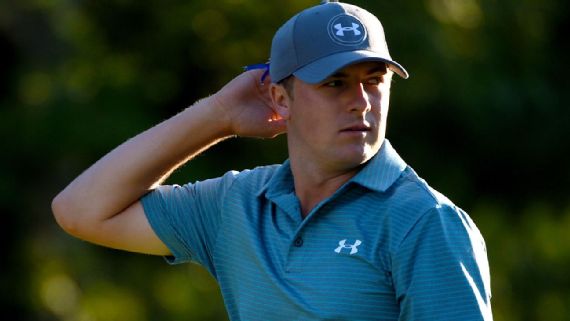Where Does Jordan Spieth Go From Here?
/The more meaningless-than-usual "playoffs" continue on Monday with the conclusion of the Deutsche Bank Championship. A potentially fun finish awaits but as a sporting event, the PGA Tour's ill-timed playoffs continue to fall somewhere well behind even NASCAR and college football injury updates on the Labor Day sports radar.  But more on that scheduling debacle later.
But more on that scheduling debacle later.
Of far greater concern is the short and long term well-being of Jordan Spieth, who at 22 has suddenly proven to be human with two missed cuts and a very good shot...at reaching World No. 1 status again Monday (thanks Brian Wacker on Twitter) even though he's posing rebelliously for family Christmas cards in Newport Beach.
The correspondents on site in Boston clearly didn't see a whole lot wrong with this physical game, just an obvious underlying fatigue.
Karen Crouse in the New York Times after Spieth's opening 75:
With his runner-up finish to Day at the PGA Championship, Spieth ascended to world No. 1, becoming the first American not named Tiger Woods to reach the top since 1999. The crown proved heavy, and Spieth staggered under the weight of the extra attention and added demands. At the Barclays, he failed to break par in consecutive rounds for the first time in 2015, and on Friday he extended the streak with a 75.
When Spieth carded a three at No. 15, his sixth hole of the day, it was his first birdie in 13 holes, dating to last week. He had a couple of tough bunker shots on his first nine, and when he failed to hole them, he looked stricken. With expectations that high, 12 holes without a birdie must seem like forever.
Like Day, Spieth put in the work, and it has paid off. But fatigue has frayed his patience, which has caused his confidence to fray.
After Spieth missed the cut, Jason Sobel at ESPN.com offered a simple assessment: Spieth's mental game was off. How does Sobel know this? Spieth confirmed.
"Normally my mental game is a strength of mine," he explained. "And it's something I feel like I have an advantage over other players on. These past two weeks, it was a weakness for me. And I've just got to go back and reassess how to remain positive."
Where does this leave the game's most important young player?
Sam Weinman opines that Spieth finds himself at a crucial juncture with player of the year on the line and the overall good vibes from 2015 in danger of being harmed.
It's a curious thing to say, but for a guy who headed to St. Andrews this summer with a chance to win three consecutive majors, it might actually be Jordan Spieth's next tournament that counts as the most important of his year.
Spieth has now missed two consecutive cuts. He hasn't broken 73 in four rounds. Plenty of players on tour endure these sorts of dry spells, but rarely is it a guy who won two majors that year and is just days removed from being the No. 1 player in the world. How would we assess his year if it ends with such a thud?
For starters, there is the once open-and-shut Player of the Year Award debate. Perhaps Spieth still deserves it based on his otherworldly record in majors. But consider the scenario if Spieth flounders through the FedEx Cup playoffs, and Jason Day -- already with one major and four wins for the season -- cruises to the $10 million bonus and claims the top spot in the world ranking? Shouldn't we at least discuss it?
Beyond that, though, there is the larger question of how Spieth handles adversity.
I agree that Spieth's next event is crucial, which is why he ought to pass on the BMW Championship, put himself in some tropical place where he can Instagram cool photos from, and show up at the Tour Championship a bit refreshed. Then get the Presidents Cup over with, and go back to the same tropical place or to some UT football games, only to resurface in Australia in December to defend your title there.
Nothing will be gained from playing Conway Farms and the BMW. Zilch. Nada!











